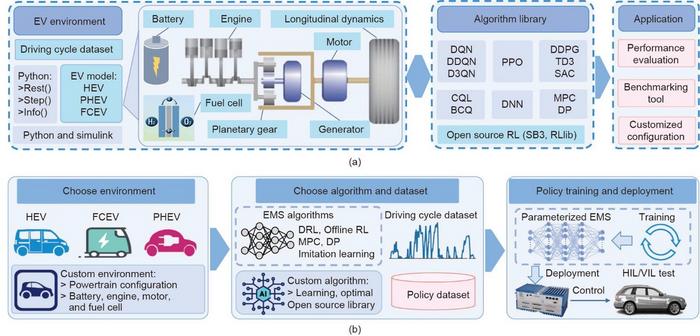A groundbreaking study published in the esteemed journal Engineering has introduced an innovative framework called LearningEMS, which is poised to transform the field of energy management strategies (EMS) for electric vehicles (EVs). With the automotive industry rapidly evolving due to the escalating global focus on sustainability, this study presents a vital resource for engineers and researchers dedicated to improving the efficiency of energy management in diverse EV configurations.
Electric vehicles, including battery electric vehicles (BEVs), hybrid electric vehicles (HEVs), fuel cell electric vehicles (FCEVs), and plug-in hybrid electric vehicles (PHEVs), are becoming increasingly mainstream. However, the complexity of managing energy within these vehicles presents a significant challenge. An efficient energy management system is essential to optimize the performance of these vehicles, ensuring they operate at peak efficiency while minimizing energy consumption and enhancing overall user experience.
The backbone of this new framework, LearningEMS, facilitates the development and benchmarking of various EMS algorithms by providing a comprehensive platform that encompasses numerous EV configurations. The framework supports a scientific evaluation of diverse algorithms, such as imitation learning, deep reinforcement learning, offline reinforcement learning, model predictive control, and dynamic programming techniques. This depth of choice is crucial for researchers aiming to tailor EMS solutions to the specific requirements of different vehicle types and operating conditions.
LearningEMS is not merely theoretical; it comes equipped with three distinct EV platforms, a robust dataset comprising over 10,000 km of EMS policy, ten state-of-the-art algorithms, and over 160 benchmark tasks. The integration of three prominent learning libraries further enhances the framework’s utility, making it a powerful tool for simulating various energy management scenarios and evaluating the effectiveness of different approaches.
The creators of LearningEMS undertook a meticulous evaluation of the various algorithms it encompasses, focusing on critical performance metrics such as energy efficiency, consistency under varied conditions, adaptability to different driving styles, and real-world practicability. Initial findings from benchmark tests reveal substantial insights; for instance, discrete action space algorithms like Deep Q-Networks (DQN) and its variant, the Dueling DQN (D3QN), excel in simpler EMS contexts. However, these algorithms face challenges in managing more intricate control parameters typically seen in advanced EV technology.
In contrast, the study indicates that off-policy algorithms functioning within continuous action spaces—exemplified by Deep Deterministic Policy Gradient (DDPG), Twin Delayed DDPG (TD3), and Soft Actor-Critic (SAC)—demonstrate exceptional potential for optimizing energy efficiency. These algorithms showcase a remarkable ability to adapt and maintain consistency during varied driving conditions, making them particularly valuable for real-world applications where unpredictability is a norm.
The research team also explored the nuances of reinforcement learning in EV energy management, emphasizing the significance of state definitions, reward structures, and action selections. Each of these elements plays a pivotal role in determining how effectively an EMS can perform in real-world applications. Understanding these components is essential for developing systems that not only function in simulated environments but also thrive in practical scenarios that e-mobility solutions face daily.
Notably, the study introduces a novel method for policy extraction and reconstruction, aimed at deploying learning-based EMS into actual vehicle controllers. This development is groundbreaking, highlighting the framework’s feasibility in practical settings through hardware-in-the-loop (HIL) experiments. The real-time integration of these sophisticated algorithms into physical EVs could dramatically streamline energy management processes, leading to enhanced vehicle performance and sustainability.
According to the researchers, LearningEMS harbors significant potential for optimizing energy efficiency, which could consequently decrease vehicular operating costs while extending the overall lifespan of critical power systems. This potential is particularly relevant in a market increasingly steeped in the demands for high-performance, sustainable transportation solutions. As the automotive sector pivots toward electrification, innovations like LearningEMS pave the way for advanced solutions that harmonize technology with environmental stewardship.
Moreover, the open-source nature of LearningEMS acts as a catalyst for further academic and practical advancements in the scope of EV energy management. By making this framework accessible, the developers invite collaboration from engineers and researchers worldwide, fostering an environment conducive to creativity and technological progression in energy management strategies.
As a trailblazing framework, LearningEMS not only aims to enrich the realm of EMS for electric vehicles but also echoes the pressing global trend towards sustainability and efficiency in transportation. The authors surmise that as technological advancements continue to evolve, the insights derived from LearningEMS will undoubtedly assist in shaping the future of energy management systems, ultimately leading to more sustainable and efficient practices in the automotive industry.
In conclusion, LearningEMS represents a significant step forward in addressing the complexities of energy management in electric vehicles. Through its innovative design and comprehensive evaluation processes, it stands to revolutionize how engineers and researchers approach the challenge of optimizing energy use in EVs. With the potential to enhance energy efficiency, lower operational costs, and extend the lifespan of power systems, LearningEMS is set to become an invaluable resource in the ongoing pursuit of sustainable vehicular technology.
Subject of Research: Learning-based energy management systems for electric vehicles
Article Title: LearningEMS: A Unified Framework and Open-source Benchmark for Learning-based Energy Management of Electric Vehicles
News Publication Date: 11-Dec-2024
Web References: https://doi.org/10.1016/j.eng.2024.10.021
References: Yong Wang et al.
Image Credits: Yong Wang et al.
Keywords
Electric vehicles, energy management, reinforcement learning, sustainability, algorithm benchmarking, open-source framework.
Tags: algorithms for energy management systemsbattery electric vehicles efficiencyelectric vehicle energy managementenergy consumption reduction in EVsfuel cell electric vehicles solutionshybrid electric vehicles performanceLearningEMS frameworkmachine learning in electric vehiclesoptimizing energy management strategiespeak efficiency in electric vehiclesplug-in hybrid electric vehicles technologysustainable automotive innovations





